Can chocolate tasting unite Trump’s America?
- Published
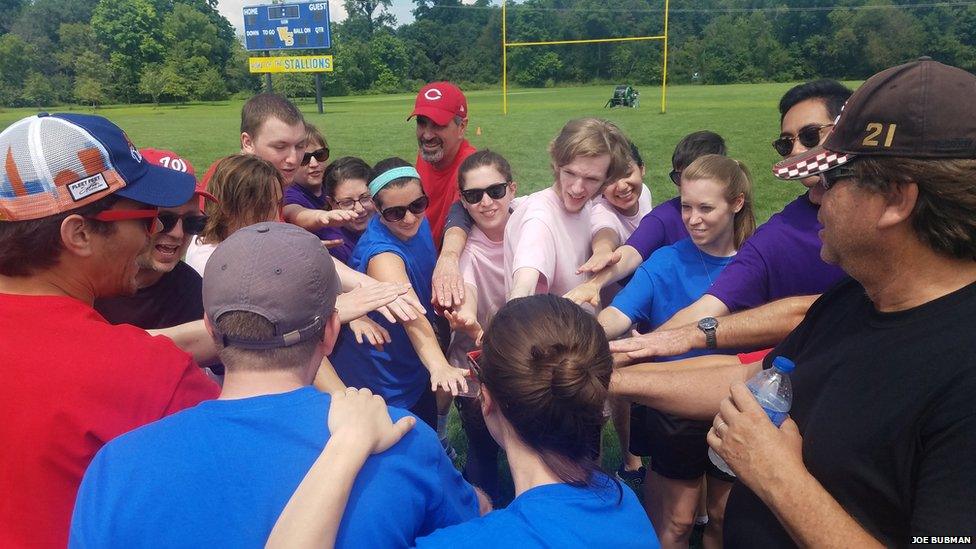
The Super Decathlon brought people from rural and urban areas together to play games
The rancorous confirmation of the new US Supreme Court justice, Brett Kavanaugh, has revealed how deeply divided the country is. The distance between the left and right feels cavernous. Can Americans from different political backgrounds bond over sport and chocolate-tasting?
It's just gone 9am on a Saturday morning and a group of more than 30 people have gathered at a sports field in the centre of Waynesboro, Pennsylvania.
A two hour ride from Washington DC, it's a rural township where the urban sprawl of the nation's capital has been traded for green fields and woodland, set against mountain views and a powder-blue sky.
As the group assemble around picnic tables they make their introductions as they munch on bagels and drink coffee.
Half of the people here have travelled from Washington DC, while the other half are locals from Franklin County, where Waynesboro, a town with a predominantly white population of ten thousand people sits.
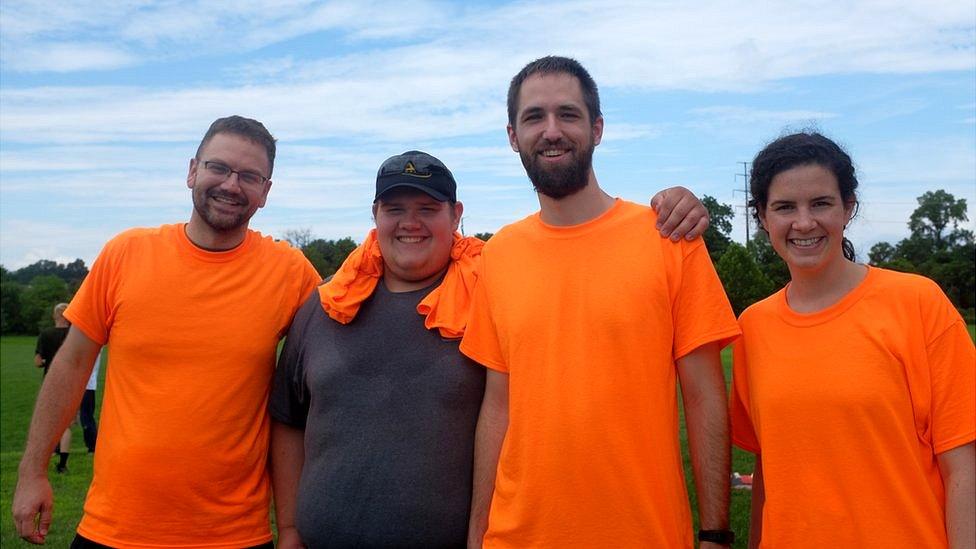
Beau, Stuart, Christopher and Allison
They're here to take part in what organisers call the "Super Decathlon" a day-long event which brings together teams of four - two urban, two rural - to compete in a range of events.
"There are lots of divides in our country right now, one of which is the divide between people who live in urban and rural areas," says Joe Bubman, who has organised the day's activities.
Bubman points to data from the Pew research centre, external which suggests that the majority of rural dwellers (58%) believe those in urban America have different values to them, with a similar percentage of urban dwellers (53%) feeling the same about those in rural areas.
The same survey shows that 70% of those in rural areas and 65% in urban areas, feel people who live in a different type of community to them don't understand their concerns.
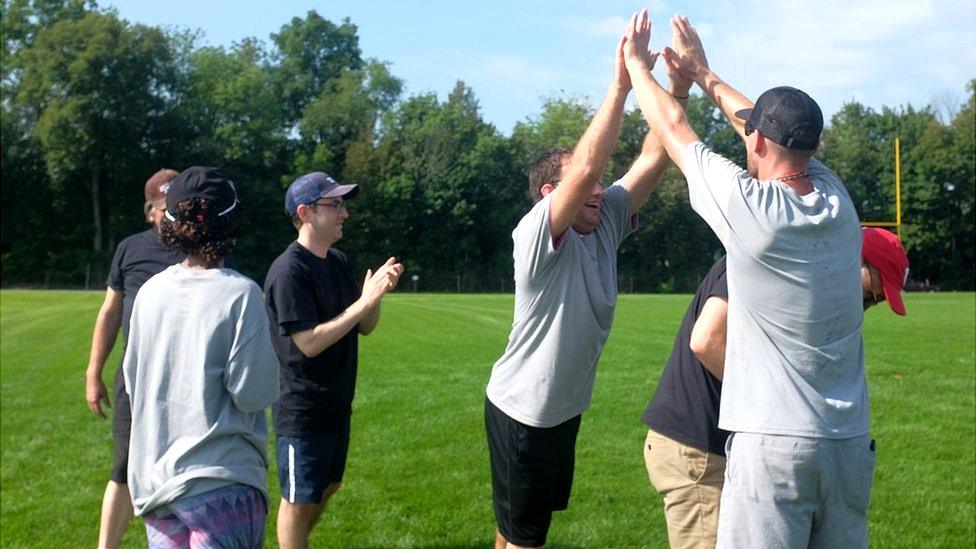
"Our hypothesis is that one of the reasons for these divisions is that there's not much interaction between rural and urban communities."
"We believe that people are more likely to engage in discussions on substantive issues if you are first able are interact with someone else as a fellow human, as a fellow American," adds Bubman who is in his second year of such an event.
Joe and his co-organiser David Michaels, hope that through 10 different activities - everything from kickball to dodgeball, rock paper scissors to trivia quiz, relay race, blindfold dessert tasting, and Sudoku - they can do their bit to break down some of the divisions in the country.
There's not much time to make small talk before teams are thrust into their first activity, a game of kickball.
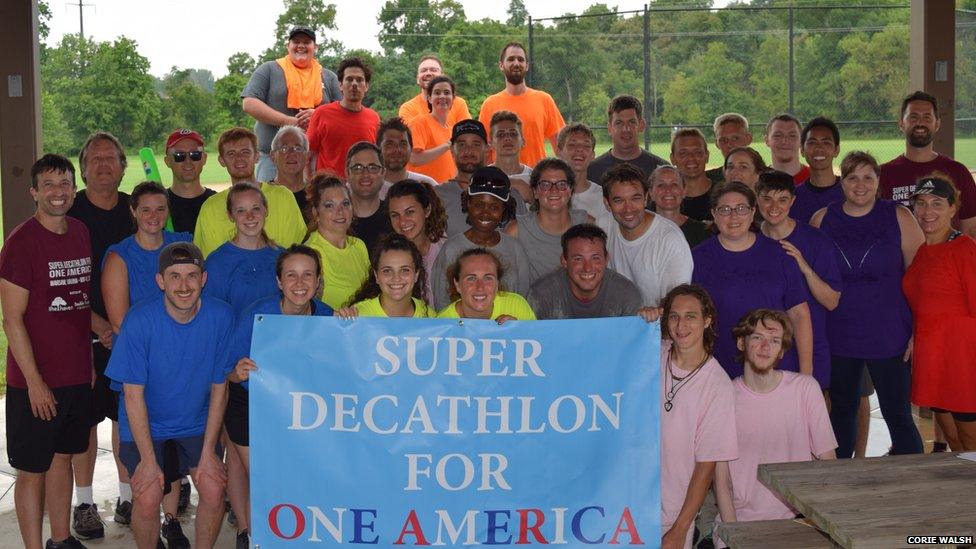
The Super Decathlon aims to build lasting friendships across divides
On the pitch I meet Golzar Meamar from Washington DC, who was encouraged to attend by her housemate.
By her own admission, she wouldn't otherwise visit a place like Waynesboro but she's pleased to attend, not least to break down some of the misconceptions rural and urban Americans have about each other.
"Something I've heard a lot is this idea that those in urban communities live frivolously, live differently and are mean and unkind to neighbours," she tells me, "and that we don't care about community."
For Golzar this is the biggest myth she hopes to dispel through the day, "There's a community bonding experience that we all share, we all just want to love… regardless of where we live."
It's heartening to see how Golzar and her team, who are wearing pink, gel so quickly over their shared experiences on the sports field. Shortly after the game of kickball end, the teams line up facing each other to play a mammoth game of rock, paper, scissors.
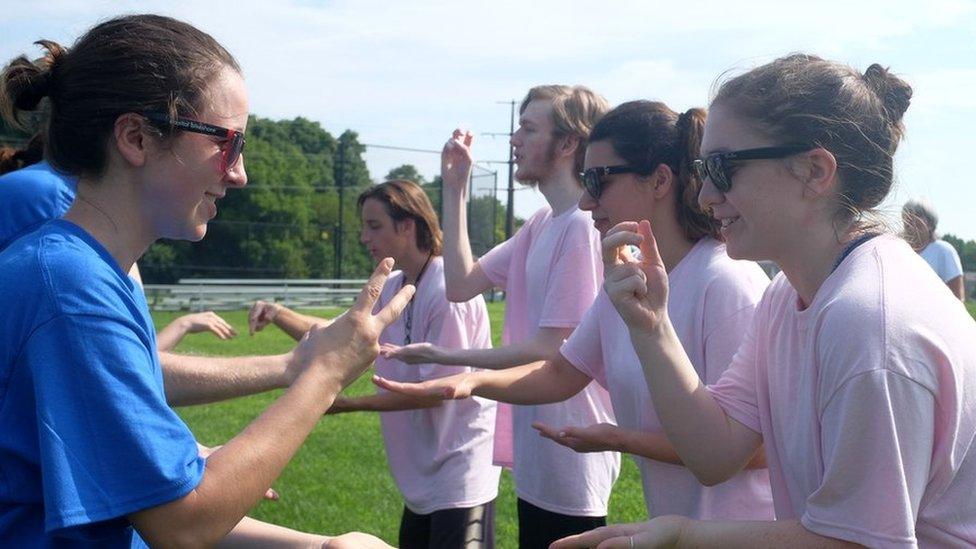
Rock, Paper, Scissors
A refrain of "rock, paper, scissors…shoot", ripples along the line as the teams engage in a slightly unconventional bonding experience.
As Golzar competes with a player from the red team, her allies in pink - John, Josh and Corie - watch on, throwing their hands in the air enthusiastically when she wins a round.
John and Josh, who are from Franklin county, tell me what they think are the biggest misconceptions people have about those who live in the countryside.
"I feel that everyone thinks that we're farmers. That we all work with cows and plant crops and harvest corn," says John, who works at an after-school club in the area.
"I don't even live near a farm," he adds incredulously.
John doesn't believe America is as divided as many would think it is. "I don't really feel that anything is really going to divide us like in the Civil War. I think it's more of the media twisting on both sides, about how it really is."
More than 70% of residents in Franklin County voted for Donald Trump, including Josh, who says he never has a problem talking about the issues of the day with friends across the political spectrum.
His rural teammate Josh, who leans "more negative" towards Mr Trump has a slightly different take.
"I think tensions are very high and opinions are very heated, so there aren't a whole lot of proper discussions being had about certain topics."
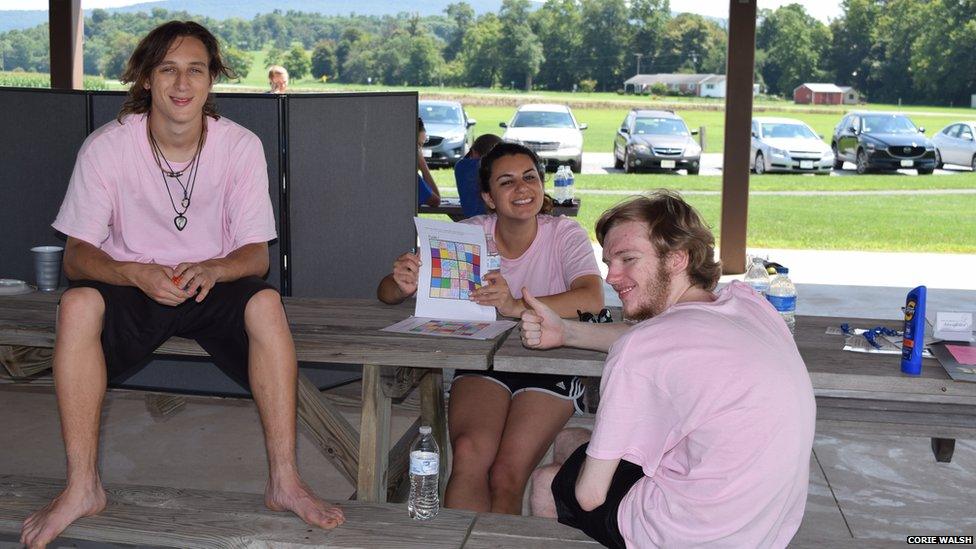
John, Golzar and Josh bonded through the day
And that's definitely the case during the Super Decathlon. Most teams are divided along political lines, but team talk is firmly focused on winning the day's events, rather than who won the 2016 election.
As I approach the orange team, who are preparing for their chocolate tasting round, I ask them if they've discussed politics in any way.
"I think it feels uncomfortable quite frankly talking about politics these days," Allison Shean, who works in international development in Washington DC tells me.
Allison was one of the 90% of DC residents who cast a ballot for Hillary Clinton. She might have voted for a different candidate to her team mate Stuart Ocker, who works in manufacturing in Greencastle, Pennsylvania, but on this matter they agree.
"I usually shy away from talking politics just because I don't follow it all that closely.
"It is just easier to stay on common ground to unite with somebody, than rip each other apart for no reason."
Both believe there are opportunities to come together in America, despite their political differences.
"We're on the same team today," they tell me in unison.
"When you have days like today, where you're coming together and playing dodgeball or kickball, you really recognise that we're all kind of just out here to have fun," adds Allison.
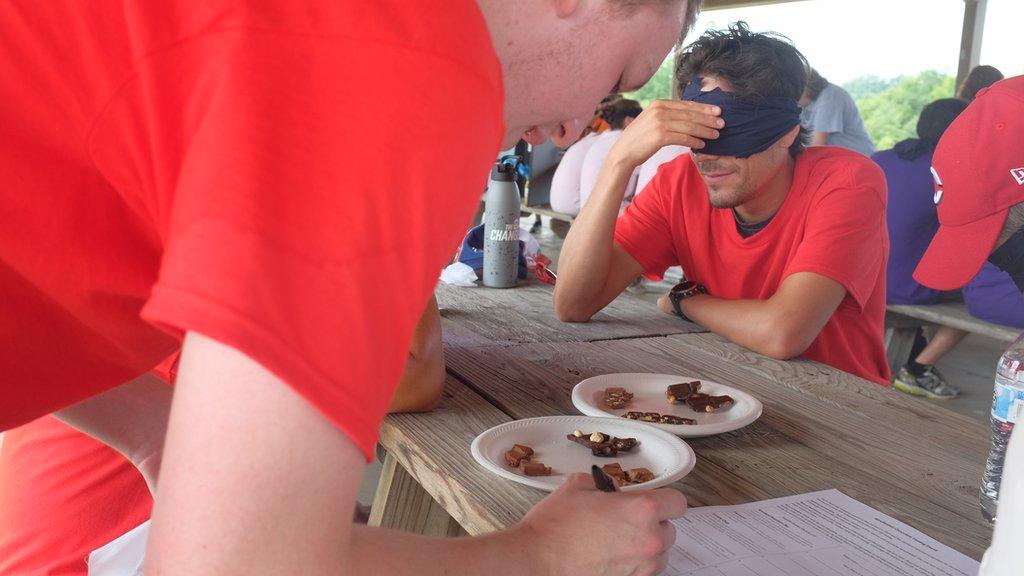
Can chocolate tasting sweeten a divided nation?
As the day winds up, the teams are blindfolded to guess the flavour of different chocolates.
It is striking to see how a focus on whether the dark chocolate is honey roasted or sprinkled with cinnamon can unite people.
"What better way to bring America together than by tasting chocolate," quips Jay Lurie, a member of the red team who works in international development in Washington DC.
"I can definitely see people breaking down barriers and bonding. Today has pulled me out of my comfort zone so I forget the daily news feed for a moment and focus on connecting with people."
As the day wraps up, the humid summer heat is swapped for torrential rain as the winners are announced.
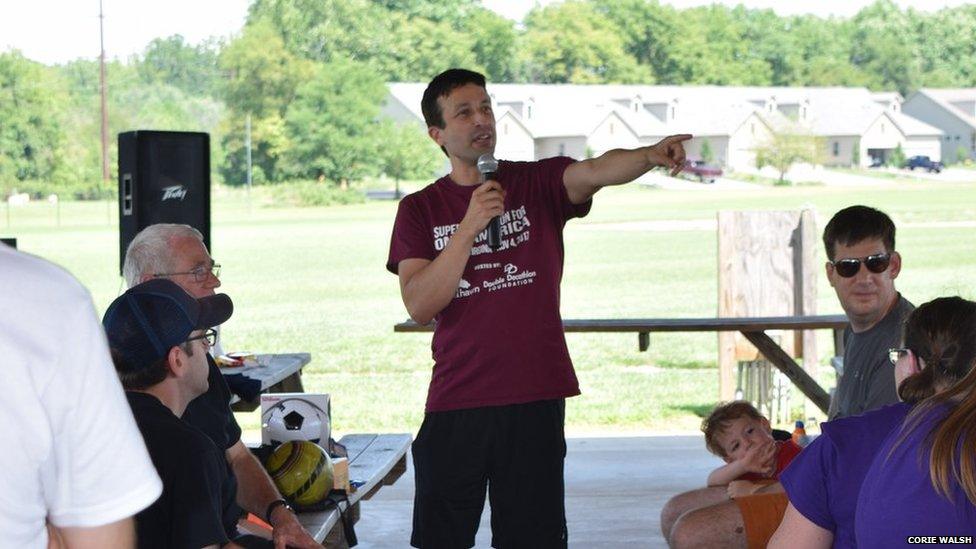
Joe Bubman came up with the idea as a way to develop human interaction across geographic divides
The group then poses for a photo before saying their goodbyes - and in some cases exchange contacts - as those from the city prepare for their drive back to Washington DC.
Organisers hope that the lasting legacy of this sort of event are new friendships.
"Even if it's things like becoming friends on Facebook that makes a difference because it may change what shows up in your news feed because you are then seeing perspectives of people who are living in different communities," says Bubman.
He plans to bring some of the participants together again in October to work together on a clean-up of the Appalachian nature trail in the area, one way Bubman says to come together on local projects, even if their national views are different.
Bubman hopes to expand his project more broadly but warns that the mid term elections provide a challenge.
"I think they are not putting the country over their political party.
"We need to channel activism to not just getting your preferred political candidate elected, but to collaborate across the partisan divide."
Follow Rajini on Twitter @BBCRajiniv, external